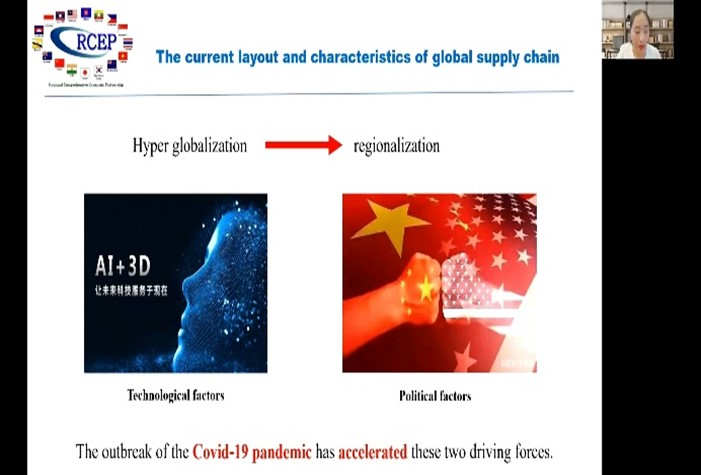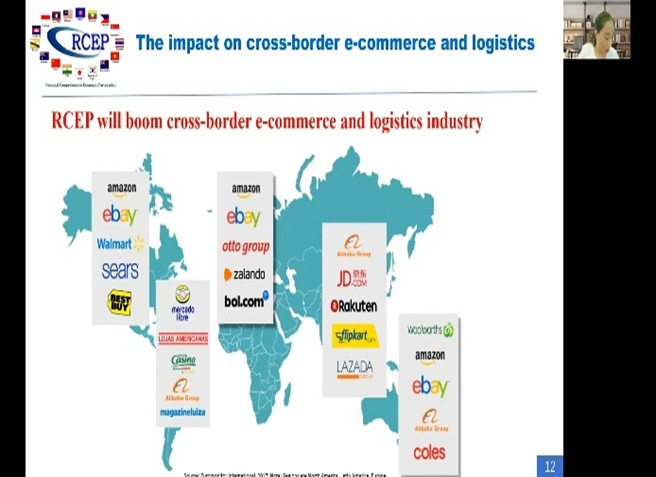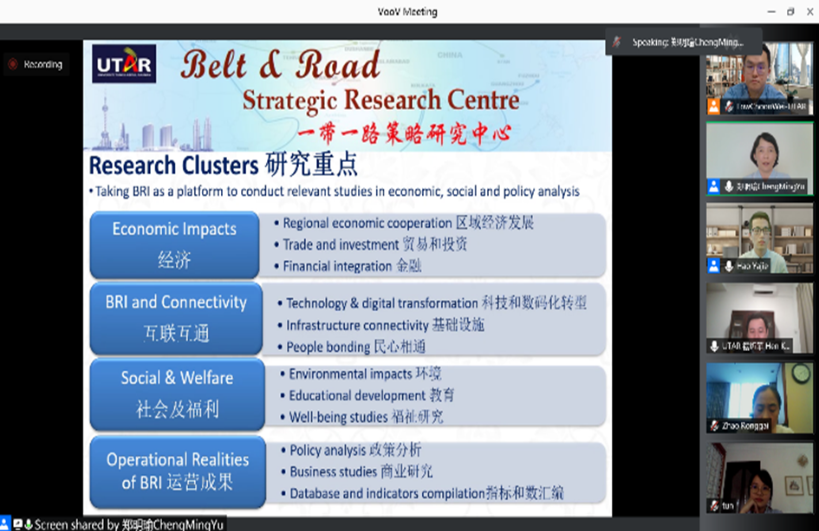RCEP and Infrastructure Development: E-commerce and Supply Chain
RCEP and Infrastructure Development: E-commerce and Supply Chain “RCEP and Infrastructure Development: E-commerce and Supply Chain” was organised by the Belt and Road Strategic Research Centre (BRSRC) in collaboration with Shijiazhuang Posts and Telecommunications Technical College, China on 25 June 2021. The seminar was prepared as a platform for researchers from both institutions to explore the opportunities for research collaboration in the areas of Regional Comprehensive Economic Partnership (RCEP) and infrastructure development for the promotion of e-commerce and supply chains activities in China and Malaysia.
The seminar started with the introduction of the agenda and speaker by the moderator, Mr. Low Choon Wei. Professor Dr. Cheng Ming Yu, the BRSRC Chairperson was invited to deliver her welcoming speech, followed by the openng speech by Prof Zhao Shuanling from Shijiazhuang Posts and Telecommunications Technical College.
Prof Cheng is delivering her welcoming speech and introduction of BRSRC
Ms. Zhao Ronggai from Shijiazhuang Posts and Telecommunications Technical College started the presentation with her title “The Research on the Changes Brought by RCEP to the Global Supply Chain”. Also, she presented another paper “The Research on The Impact of RCEP on Cross-Border E-Commerce and Logistics Industries” on behalf of Ms. Peng. Both the presentations focused on globalisation and regionalisation, as well as the impacts of RCEP on e-commerce and logistic industries. She presented some important data on the trend of future supply chains and enterprises’ countermeasures.


Ms. Zhao Ronggai is presenting the changes brought by RCEP and its impacts on e-commerce and logistics industries.
Prof Zhao Shuanling presented his findings on the “Prospect of the Development of Postal Service and Express Delivery Industry in RCEP Region”. He highlighted the essence and characteristics of the RCEP. There are opportunities for RCEP to promote the development of postal services and the express delivery industry. Prof Zhao mentioned that there are developments in the postal express industry in the RCEP region.
The presentation continued with the speakers from UTAR, Dr. Tun Yin Li. Her presentation focused on internationalisation and the impacts of RCEP on the economy. Her research findings showed that many important factors boost the firm’s internationalisation. Ownership of products/ services or raw materials, condition of the home country, knowledge on international business, and the supporting ecosystems are important to be further examined. She added that RCEP benefited many economic sectors, small and medium enterprises (SMEs), as well as promoted regional economic integration.

Dr. Tun is presenting the important factors for firms' internationalisation
Dr. Hen Kai Wah (from UTAR) presented his research, entitled “Effects of pandemic and lockdowns: Assessing the Malaysian E-commerce Ecosystem”. In the presentation, Dr. Hen stressed the impacts of COVID-19 on Malaysia's trade. The COVID-19 has brought disruptions to the regional and supply chains and services (especially transportations and logistics). From his research, Dr. Hen found that online purchases have increased by 6 to 10 percentage points across most product categories. Online purchasers mainly focused on electrical goods, tools, education and online courses, health, etc. Dr. Hen also presented the e-commerce ecosystems.

Dr. Hen is sharing his views on the impacts of pandemics and lockdowns on Malaysian business and e-commerce
The seminar ended with the Q&A session and discussion for future collaboration between UTAR and Shijiazhuang Posts and Telecommunications Technical College in the aspects of research, publication, and training programmes.


